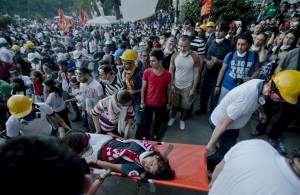Turkey warns it may use army to end protest unrest

A girl is evacuated on a stretcher after riot police flooded the Gazi Park with tear gas during clashes at the Taksim Square in Istanbul Tuesday, June 11, 2013. Riot police are re-entering Istanbul’s Taksim Square after defiant protesters swarmed back in by the thousands. INQUIRER file photo
ISTANBUL—Turkey warned on Monday it may bring in the army to help quell nearly three weeks of nationwide anti-government protests as two major union federations went on strike over police violence against demonstrators.
The government raised the threat of putting soldiers on the streets after a weekend of violent clashes sparked by the eviction of campers occupying Istanbul’s Gezi Park, the epicentre of the protest movement.
Police “will use all their powers” to end the unrest, Deputy Prime Minister Bulent Arinc said in a televised interview. “If this is not enough, we can even utilise the Turkish armed forces in cities.”
The deployment of the military, the self-described guardian of the secular state, would mark an escalation of a crisis posing the biggest challenge yet to Prime Minister Recep Tayyip Erdogan’s Islamic-rooted government.
But after losing their focal protest site, with Gezi Park and the adjoining Taksim Square still guarded by police on Monday, the demos appeared to lose some of their intensity.
Article continues after this advertisementThe more subdued mood was in stark contrast to the weekend, when riot police fired volleys of tear gas and jets of water in hours-long running battles with thousands of protesters.
Article continues after this advertisementGroups of hundreds of striking workers from the KESK and DISK union federations took to the streets in Istanbul, Ankara and the western city of Izmir calling for the police violence against protesters to end immediately and chanting “Erdogan, resign!”
Their progress was at times blocked by officers backed by water cannon trucks but there were no reports of fresh clashes.
The unions’ turnout was smaller than when they marched in support of the demonstrators on June 5.
After the members dispersed in Istanbul in the evening, some 300 youngsters clashed briefly with police who fired tear gas, water and rubber bullets.
Turkey’s crisis began when a sit-in to save Gezi’s 600 trees from being razed in a redevelopment project prompted a brutal police response on May 31, spiralling into countrywide demonstrations against Erdogan, seen as increasingly authoritarian.
So far four people have been killed and nearly 7,500 people injured, according to the Turkish Medical Association (TBB).
At a rally of more than 100,000 supporters of his ruling Justice and Development Party (AKP) on Sunday, Erdogan defended his response to the demos, saying it was his “duty as prime minister” to order police to storm Gezi Park after protesters defied his warnings to clear out.
He also vowed to go after those who had offered assistance to the protesters, in a nod to the luxury hotels who opened their doors to people fleeing the clouds of tear gas and jets of water during the park’s evacuation on Saturday.
“We know the ones who sheltered in their hotels those who cooperated with terror. They will be held accountable,” the combative premier said
Merkel ‘shocked’ by violence
The United States and other Western allies have widely criticized Erdogan’s handling of the crisis, undermining Turkey’s image as a model of Islamic democracy.
Some Turkish leaders, including Erdogan, have suggested that outside forces are behind the demonstrations in a bid to destabilize the country.
On Monday Washington denied any role in the recent unrest.
“We absolutely reject the accusations that US groups or individuals are responsible for or have elevated, or escalated, I should actually say, the protests in Turkey,” State Department spokeswoman Jen Psaki said.
German Chancellor Angela Merkel on Monday urged Turkey to respect democratic freedoms and said the police response to the protesters “was much too harsh”.
“I am in any case shocked,” she told RTL television.
Opponents accuse Erdogan of forcing Islamic conservative reforms on the mainly Muslim but staunchly secular nation of 76 million, and of pushing big urban development projects at the expense of local residents.
But Erdogan, 59, has been in power since 2002 and remains popular. His AKP has won three elections in a row, taking nearly half the vote in 2011 after presiding over strong economic growth.
A survey by Metropoll, published in the Zaman daily, found that the AKP would still come first if elections were held now, with 35.3 percent of the vote.
That the government has said it may call in the pro-secular army—which has been steadily sidelined during Erdogan’s decade-long rule—shows it wants to end the current turmoil “at any cost”, said professor Ilter Turan, a political scientist at Istanbul’s Bilgi University.
“This also indicates the government’s acknowledgement that what’s happening is extraordinary,” he added.